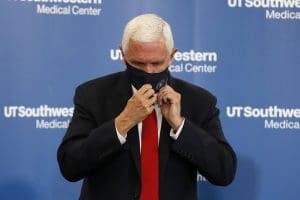Republicans finally think wearing masks is good after months of denial
Up until recently, most Republican lawmakers were denying the effectiveness of face masks in slowing the spread of coronavirus.

Republican leaders are finally encouraging Americans to wear masks in order to stop the spread of the coronavirus, weeks after health experts first advised the public to do so.
The change in tone comes as cases continue to increase in 35 states and polls show Americans increasingly souring on Donald Trump’s handling of the crisis.
During a visit Sunday to the University of Texas Southwestern Medical Center in Dallas, Texas, a coronavirus hotspot, Vice President Mike Pence said “wearing a mask is just a good idea.”
Pence made the comment less than two months after he was criticized for refusing to wear a mask during a visit to the Mayo Clinic in Minnesota.
On Monday, Senate Majority Leader Mitch McConnell took to the Senate floor where he urged people to wear masks, saying doing so “is not about protecting ourselves, it is about protecting everyone we encounter.”
Republican senators, including Shelly Moore Capito of West Virginia, Martha McSally of Arizona, and Tim Scott of South Carolina, have all used their social media presence in recent days to encourage the use of face masks.
And on Friday, Wyoming Rep. Liz Cheney tweeted a photo of her father, former Vice President Dick Cheney, wearing a mask, along with the message, “Dick Cheney says WEAR A MASK. #realmenwearmasks.”
Even one of Trump’s favorite television programs, “Fox & Friends,” implored Trump to wear a mask, which he has so far mostly refused to do. Wearing a mask, said co-host Steve Doocy, “would just set a good example, he’d be a good role model.”
The position is a stark reversal from the party’s previous anti-mask position.
Rep. Clay Higgins (R-LA) told CNN as recently as May 28 that wearing a mask was “part of the dehumanization of the children of God.”
That same month, Trump retweeted Fox News personality Brit Hume after Hume mocked Democratic presumptive nominee Joe Biden for wearing a mask.
While some Republican leaders are finally encouraging Americans to wear masks, Trump has refused to wear masks or encourage his supporters to do so.
At recent campaign events in both Tulsa and Phoenix, Trump spoke to largely unmasked crowds. In Tulsa, attendees did not practice social distancing and most did not wear masks. At least eight campaign staffers at that rally later tested positive for coronavirus, prompting officials to force all staffers who attended the event to get tested as well.
The GOP break with Trump’s lax attitude toward a proven virus safety measure coincides with polling that shows Americans increasingly unhappy with how Trump is handling the crisis and his presidency overall.
According to a CBS News poll, the percentage of Americans who say Trump has done a “good job” handling the pandemic has dropped from 53% in March to 41% this month
On Sunday, former New Jersey Gov. Chris Christie, a Republican with close ties to Trump, told ABC’s “This Week” that if Trump “doesn’t change course, both in terms of the substance of what he’s discussing and the way that he approaches the American people,” he would most likely lose the presidential race in November.
“There’s no question that while these national polls are less significant in terms of the raw numbers, the trend is obvious,” Christie said. “The trend is moving towards Joe Biden, when Joe Biden hasn’t said a word. …No discredit to the vice president, if you’re winning without doing anything, why do anything?”
As of Tuesday afternoon, the United States had more than 2.6 million confirmed coronavirus cases, according to the New York Times. At least 126,161 people have died.
Published with permission of The American Independent Foundation.
Recommended

Biden campaign launches new ad focused on Affordable Care Act
Former President Trump has said he wants to do away with the popular health care law.
By Kim Lyons, Pennsylvania Capital-Star - May 08, 2024
Ohio doctors fear effects of emergency abortion care case set to go before U.S. Supreme Court
A federal law that allows emergency departments to treat patients without regard to their ability to pay will be under U.S. Supreme Court scrutiny this week, and Ohio doctors are concerned about the case’s local impact on emergency abortion care.
By Susan Tebben, Ohio Capital Journal - April 23, 2024
House GOP votes to end flu, whooping cough vaccine rules for foster and adoptive families
A bill to eliminate flu and whooping cough vaccine requirements for adoptive and foster families caring for babies and medically fragile kids is heading to the governor’s desk.
By Anita Wadhwani, Tennessee Lookout - March 26, 2024














































































